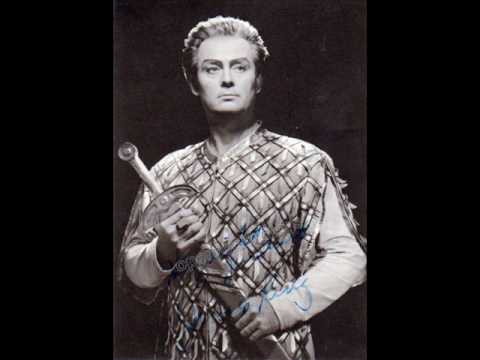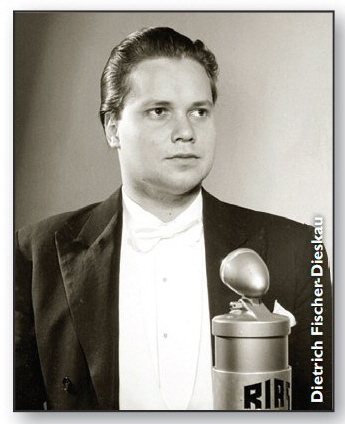|
SATURDEE OPRY LINKS 61: Grab
Bag
 
James King
Dietrich Fischer-Dieskau
Saturdee Opry Links Overture!
"Idomeneo," by Mozart.
https://www.youtube.com/watch?v=fUKrfUzjuQE
1.
"See how the clouds melt away from the face of the sky when the sun shines, its
brightness beaming," so sing the gypsies in the so-called "anvil chorus" from
Verdi's "Il Trovatore." Not a bad sentiment for starting the day, and Saturdee
Opry Links.
Here is the chorus of the Hungarian State Opera.
https://www.youtube.com/watch?v=yjMHCzoneuM
Translation:
https://en.wikipedia.org/wiki/Anvil_Chorus
Synopsis:
Act 2: The gypsies sing the Anvil Chorus: "Vedi le fosche notturne" / "See! The
endless sky casts off her sombre nightly garb...". Azucena, the daughter of the
Gypsy burnt by the count, is still haunted by her duty to avenge her mother.
2.
There is another anvil chorus in opera, aside from "Il Trovatore." Rather, it's
a chorus of anvils---in "Das Rheingold," by Wagner. This is part of one of the
most beautiful and dramatic instrumental interludes in all opera, the "Descent
into Niebelheim," in which the gods, Wotan and Loge, creep into a rocky
passageway go down, down, down into a netherworld of enslaved dwarves lorded
over by the evil Alberich. Alberich, of course, has stolen the Rheingold---the
precious horde of gold once protected and loved by the Rhine maidens---an act
that could only have been carried out by one who renounced love. Wotan, the king
of the gods, and the cunning Loge, intend to trick Alberich out of the gold, as
it holds the power to rule the universe. Upon entering Niebelheim, the orchestra
stops entirely, and all you hear are anvils being struck. Quite a chilling
moment. This strange production from Valencia is positively psychedelic. (The
anvils come in after the two-minute mark, but don't skip ahead---the music is
too good.)
https://www.youtube.com/watch?v=LQ3q3LyjnmA
3.
You sort of wonder if soprano Anna Netrebko's recent weight gain has something
to do with her starting to sing Wagner. She just made her Wagner debut in "Lohengrin"
with the Dresden Opera. Here she is with (part of) "Elsa's Dream" (or "Einsam in
trüben Tagen.")
https://www.youtube.com/watch?v=h99RzQtQK-w
Translation: (search for "Einsam")
http://www.murashev.com/opera/Lohengrin_libretto_English_German
Synopsis : Elsa relates a dream she had where a Knight in white was sent to her
by God to defend her.
Review of Netrebko in "Lohengrin"
https://www.operanews.com/Opera_News_Magazine/2016/6/In_Review/DRESDEN__Lohengrin.html
4.
Lyric tenor Piotr Beczala has also made his Wagnerian debut, along with Anna
Netrebko, in "Lohengrin." Opera News' (brilliant) reviewer, Fred Cohn, had much
praise for Netrebko, but noted that Beczala could get raw in especially taxing
upper register passages. Still, sounds plenty good to these ears. Here he is
with "In Fernem Land," an aria very much favored by one of my cats, who falls
into a deep sleep whenever she hears it.
https://www.youtube.com/watch?v=pMALOUWUnGo
Synopsis : To this point, the Knight has not been allowed to tell his name or
his origin. However, he now must leave because he has killed Frederick, the
Count of Brabant, and now tells his past. He is a Knight of the Grail from the
island of Montsalvat and his father is Parsifal, the leader of all the Knights
of Grail who strive to do good in the world as long as no one knows their
secret. He finally reveals that his true name is Lohengrin.
Translation: (search for "fernem")
http://www.murashev.com/opera/Lohengrin_libretto_English_German
About the opera:
https://en.wikipedia.org/wiki/Lohengrin_
5.
After all that Verdi-an and Wagnerian bombast, here is a palate cleanse in the
form of Puccini's tender "Humming Chorus" from "Madama Butterfly." This music
accompanies the scene where poor Butterfly waits through the night, with her
maid, Suzuki, and her little son, for the return of her beloved American
numbskull scoundrel, Pinkerton.
https://www.youtube.com/watch?v=0f1k14GQmNE
About the opera:
https://en.wikipedia.org/wiki/Madama_Butterfly
6.
Humming Chorus. . .let's see. . .segue. . .uh. . .Humming makes you think of
hummingbirds, birds and opera make you think of. . .Papageno, of course. But
here is an extraordinary illustration of "Papageno's Song" from Mozart's "The
Magic Flute," coupled with the Papageno/Papagena duet--animated silhouette art
by Lotte Reininger, from 1935!
https://www.youtube.com/watch?v=zCR-GFKmMGU
Synopsis : Papageno introduces himself to Prince Tamino and also mentions that
he probably could catch women like he can birds. "Der Vogelfänger bin ich ja,"
or "The Birdcatcher am I!"
Translation:
http://www.aria-database.com/translations/mflute02_vogel.txt
AND the duet: Synopsis : Papageno has been searching everywhere for a mate for
himself. However, he has found no one like him. About to commit suicide, he is
reminded by three spirits that he has magic bells that may help him find his
mate. He rings them and Papagena appears. They strut around each other, making
bird-like sounds before finally getting down the business of discussing their
plans for family.
Translation:
http://www.aria-database.com/translations/mflute21_papageno.txt
I regret that I do not know the name of the baritone or soprano here.
7.
Papageno. . .segue. . .let's see. . .well, short leap to Papa. Here is the most
famous father-to-son aria in opera (I think), from Verdi's "La Traviata." Now,
I've posted this on many SOL's, but never with Dietrich Fischer-Dieskau. Dieskau
only dabbled in opera, instead becoming the foremost interpreter of lieder
(Schumann, Schubert) in history. So not only is this somewhat of a rarity, but
his approach is very, uh, "interpretive," like his approach to lieder. This is
not merely sung well, but heavily, even heroically, expressed. I've never heard
anyone else sing it this way. "Di Provenza il mar."
Synopsis: Alfredo's father has convinced Violetta that it is better for everyone
if she leaves Alfredo. She begs him to love her and then sneaks out of the
house. Later, a servant brings him her farewell letter and he rushes off to find
her. Giorgio stops him though and sings this aria to remind him of their home in
Provence and to ask him to return with him.
https://www.youtube.com/watch?v=VGzEPxuwHx0
Translation:
http://www.aria-database.com/translations/traviata04_provenza.txt
8.
Dietrich Fischer-Dieskau's operatic contributions were few and far between, but
here is a memorable clip of the duet from Verdi's "Don Carlo," with tenor James
King (too forgotten.) The plot is Byzantine (surprise), but Rodrique (Marquis of
Posa) and Don Carlo, the son of the king of Spain, are great friends. Which, of
course, means they wind up killing each other. Still, they sing a noble,
rousing, duet swearing friendship. "Dieu, tu semas dans nos âmes." (Starts about
2:11) Here's more:
Synopsis:
Posa asks for the Infante's aid on behalf of the suffering people there. Carlos
reveals that he loves his stepmother. Posa is first shocked, but then
sympathetic. He encourages Carlos to leave Spain and go to Flanders, and to
forget his pain by focusing on political activity there. The two men swear
eternal friendship (Duet: "Dieu, tu semas dans nos âmes" / "Dio, che nell'alma
infondere").
https://www.youtube.com/watch?v=pd0WOZSLAKU
Translation:
http://www.metopera.org/uploadedFiles/MetOpera/about_the_met/Met_in_Schools/Educator_Guides/Don_Carlo/FriendshipThemeRes.pdf
9.
As I was saying, the great heldentenor James King is too much eclipsed. Strange
that there is so little of him available on youtube. Here is one stupendous item
from Richard Strauss's one-act opera, "Daphne." No translation available, but
none is really needed.
Synopsis : Role: Apollo, the God of Light
Setting: near the hut of Penios, ancient Greece
Synopsis: Leukippos has accused Apollo of lying about his godhood and, to prove
that he truly is a god, Apollo kills him. However, Daphne then swears to remain
at the grave of her beloved Leukippos until she joins him in death. Realizing
that he might have made a mistake, Apollo asks Dionysius, the god of wine, for
forgiveness. To make up for his mistake, Apollo begs that Leukippos be raised to
Olympus, home of the gods, in order to forevermore play the flute for Dionysius.
He then begs the father of the gods, Zeus, to have similar mercy upon Daphne and
change her into alone of her beloved laurel trees.
https://www.youtube.com/watch?v=09N88E3et1o
FINAL BOW
The somewhat forgotten James King was born in Dodge City, Kan., to an Irish
father and a mother of German descent. As a boy he learned to play the violin
and sang in church choirs, and was very fast on the draw. Just kidding. He
studied music at the University of Missouri, Kansas City, earning a master's
degree, and started out as a baritone before training as a tenor with Martial
Singher in New York, and with Max Lorenz. Here is a poor recording of a terrific
performance of "Nessun Dorma," live in 1969. The ending affords chills. (The
beginning, if you listen carefully, elicited at least one blown nose.)
https://www.youtube.com/watch?v=UWPbhokRraw
Role: Calaf, the "Unknown Prince", son of Timur
Setting: The gardens before the walls of Peking
Synopsis: A herald has just announced that no one will sleep in the city of
Peking until the Calaf's name is known to the Princess. Calaf, who knows that he
has agreed to be killed if Turandot learns his name before the morning, is not
worried. He is sure that he will be the only one to reveal his name to the
Princess and he will only do that once morning has come and the Princess has
consented to be his wife.
Translation:
http://www.aria-database.com/search.php?individualAria=318
Even his obit is strangely short.
http://www.nytimes.com/2005/11/24/arts/music/james-king-80-tenor-known-for-strauss-and-wagner-dies.html
Back to Opera Links
Back to Home Page
|



